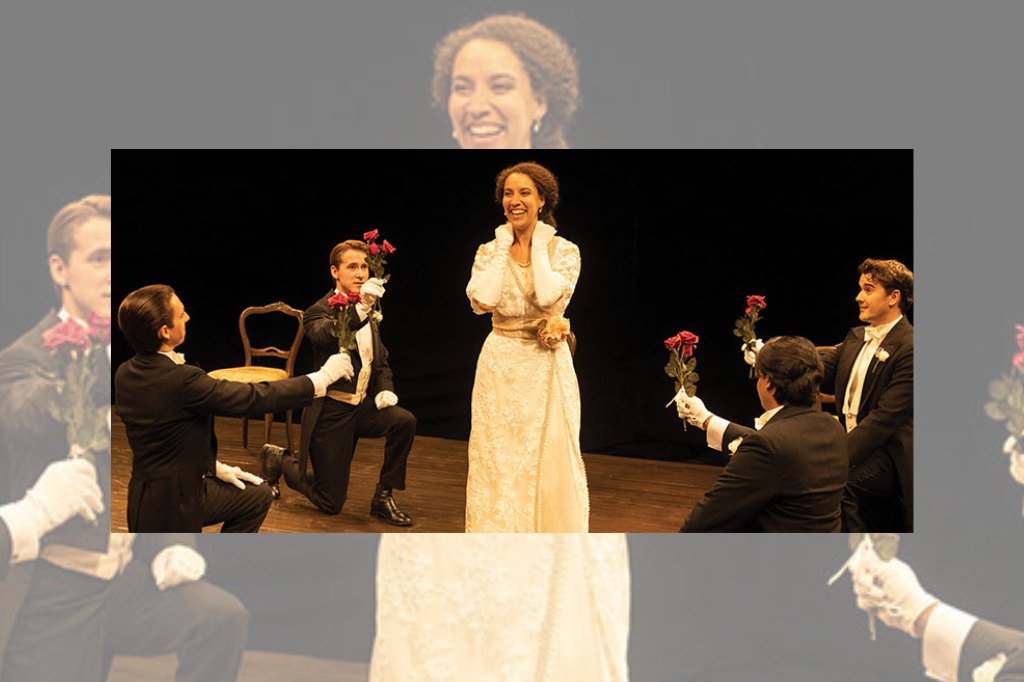REVIEW: All’s Well That Ends Well at Stratford Festival
Wow, Shakespeare scholars weren’t kidding when they called it a “problem play,” were they?
The Stratford Festival’s All’s Well That Ends Well is a commendable take on one of Shakespeare’s more frustrating plays, a production which by and large works in spite of a troublesome story. Director Scott Wentworth has moulded the Bard’s tale of fuckboys and fairytale logic into an appealing product, mustering the resources and scope that a Stratford production allows. The Tom Patterson Theatre’s long thrust stage, studded with twelve high-back dining chairs, is ably used here, and the vomitoria ( passages under the audience seating, for those who weren’t in my Theatre History II class) make for a number of high-comedy entrances.
Lowly Helen (a charming Jessica B. Hill) has her eyes on Bertram (the bumbling Jordin Hall), a member of the aristocracy who views her as a mere annoyance. Helen concocts a plot to force him to marry her, which involves her coercing the sickly King of France (Ben Carlson) to appoint Bertram as her suitor.
But Bertram’s a calculating bastard, giving Helen conditions she must fill before he will marry her — and in the meantime, he’s off to war, where he becomes infatuated with Diana (the fiery Allison Edwards-Crewe). Helen follows him, initiating a game of cat-and-mouse which ultimately Bertram in the aftermath of his infidelity, bonding Helen and Diana in friendship after having performed the bed trick — a literary device far older than Shakespeare, and one which already feels played-out. All’s Well ends with Bertram professing his love for Helen, given she’s gone to such impressive lengths to win him.
As is perhaps evident, the problem-ness of the play emerges early on. Helen is unopposed to using others as pawns in her advances towards Bertram — she ignores much of the very good advice from the Countess of Rossillion (Seana McKenna) — and the object of her affection is a rudderless rich boy with little mind for how others are affected by his actions. Bertram’s decision to marry Helen is rather abrupt: if they’re to marry, one might anticipate a fairly toxic union. A much more cogent subplot involving Bertram’s disloyal associate Parolles (Rylan Wilkie) brings a needed straightforwardness to the play — the scene in which the soldiers prank him for his foolish actions, spearheaded by a fantastic Irene Poole, is tantalizingly funny and gone too soon. Moments led by André Sills as the play’s jester Lavatch, are also hysterical, if infrequent — they punctuate a sprawling yarn with lovely tidbits of levity.
Some aesthetic choices from Wentworth are a little garbled — a World War I visual motif feels under-explored, and music throughout the production, including a sung hymn towards the end of Act I, seems in search of its context (Paul Shilton is the composer and sound designer). But the bones of the production are strong: text is at home in the mouths of Wentworth’s actors, never forced and seldom sounding arcane, and Wentworth’s blocking makes the most of the Patterson thrust, experimenting with sightlines and ensuring there are no bad seats in the theatre.
All in all, Stratford’s All’s Well That Ends Well is likely to be a treat for the Shakespeare fan in your life — a problem play fully realized with occasional brilliance in its direction — but the pitfalls of the story, which meander for a full three hours, make this one a tough watch for the more casual Billy Shakes viewer. If you see it, perhaps re-read the play first, or at the very least the excellent programme notes — this All’s Well That Ends Well is at its best when freed of its somewhat misogynistic story, when its comedic delights have adequate room to breathe.
All’s Well That Ends Well runs at the Stratford Festival through October 29. Tickets are available here.















Comments